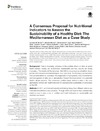Please use this identifier to cite or link to this item:
http://hdl.handle.net/10553/73640
| Title: | A Consensus Proposal for Nutritional Indicators to Assess the Sustainability of a Healthy Diet: The Mediterranean Diet as a Case Study | Authors: | Donini, Lorenzo M. Dernini, Sandro Lairon, Denis Serra-Majem, Lluis Amiot, Marie-Josephe del Balzo, Valeria Giusti, Anna-Maria Burlingame, Barbara Belahsen, Rekia Maiani, Giuseppe Polito, Angela Turrini, Aida Intorre, Federica Trichopoulou, Antonia Berry, Elliot M. |
UNESCO Clasification: | 3206 Ciencias de la nutrición | Keywords: | Greenhouse-Gas Emissions Coronary-Heart-Disease Food Portion Size Environmental-Impact Energy-Intake, et al |
Issue Date: | 2016 | Journal: | Frontiers In Nutrition | Abstract: | There is increasing evidence of the multiple effects of diets on public health nutrition, society, and environment. Sustainability and food security are closely interrelated. The traditional Mediterranean Diet (MD) is recognized as a healthier dietary pattern with a lower environmental impact. As a case study, the MD may guide innovative inter-sectorial efforts to counteract the degradation of ecosystems, loss of biodiversity, and homogeneity of diets due to globalization through the improvement of sustainable healthy dietary patterns. This consensus position paper defines a suite of the most appropriate nutrition and health indicators for assessing the sustainability of diets based on the MD.Methods: In 2011, an informal International Working Group from different national and international institutions was convened. Through online and face-to-face brainstorming meetings over 4 years, a set of nutrition and health indicators for sustainability was identified and refined.Results: Thirteen nutrition indicators of sustainability relating were identified in five areas. Biochemical characteristics of food (Al. Vegetable/animal protein consumption ratios; A2. Average dietary energy adequacy; A3. Dietary Energy Density Score; A4. Nutrient density of diet), Food Quality (A5. Fruit and vegetable consumption/intakes; A6. Dietary Diversity Score), Environment (A7. Food biodiversity composition and consumption; A8. Rate of Local/regional foods and seasonality; A9. Rate of eco-friendly food production and/or consumption), Lifestyle (A10. Physical activity/physical inactivity prevalence; Al 1. Adherence to the Mediterranean dietary pattern), Clinical Aspects (Al2. Diet-related morbidity/mortality statistics; A13. Nutritional Anthropometry). A standardized set of information was provided for each indicator: definition, methodology, background, data sources, limitations of the indicator, and references.Conclusion: The selection and analysis of these indicators has been performed (where possible) with specific reference to the MD. Sustainability of food systems is an urgent priority for governments and international organizations to address the serious socioeconomic and environmental implications of short-sighted and short-term practices for agricultural land and rural communities. These proposed nutrition indicators will be a useful methodological framework for designing health, education, and agricultural policies in order, not only to conserve the traditional diets of the Mediterranean area as a common cultural heritage and lifestyle but also to enhance the sustainability of diets in general. | URI: | http://hdl.handle.net/10553/73640 | ISSN: | 2296-861X | DOI: | 10.3389/fnut.2016.00037 | Source: | Frontiers In Nutrition [ISSN 2296-861X], v. 3, (Agosto 2016) |
| Appears in Collections: | Artículos |
WEB OF SCIENCETM
Citations
62
checked on Feb 25, 2024
Page view(s)
94
checked on Jan 20, 2024
Download(s)
37
checked on Jan 20, 2024
Google ScholarTM
Check
Altmetric
Share
Export metadata
Items in accedaCRIS are protected by copyright, with all rights reserved, unless otherwise indicated.
